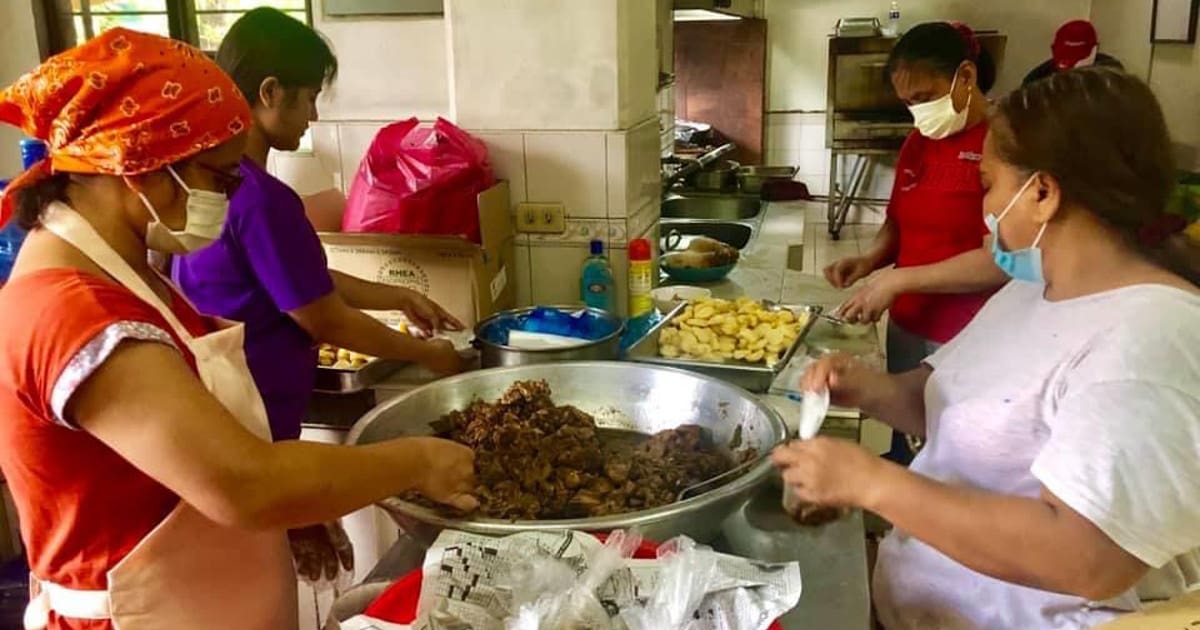“Vincent Helps”: Organizing in Time of Pandemic
The Philippines is a country frequently visited by calamities such as typhoons, floods, volcanic eruptions, earthquakes, fire and the latest pandemic. Indeed, there is never a year when one of these catastrophes has not wreaked havoc on our people especially the most vulnerable. There are even years when these occur simultaneously or one after another within a short period of time. The DC and CM groups and the Vincentian Family branches are almost constantly on their feet to respond creatively and collaboratively whenever the need arises. Below is an example of one such initiative.
Early this year—January 12 to be exact—the sudden eruption of Taal Volcano in the tourist city of Tagaytay caught everyone by surprise. This calm and scenic volcano’s last eruption was in 1977. The Vincentian Family immediately rose to action. Led mainly by the CMs, the DCs, and a good number of volunteers, they organized relief assistance by creating “Vincent Helps.” They made daily trips to Tagaytay City and nearby towns of Batangas Province to offer facemasks, food provisions and water to the affected residents temporarily housed in public schools and covered courts. Towards the end of the relief operations, they started planning the long-term rehabilitation of the most vulnerable evacuees—the residents of the volcano island itself. Two Vincentian social workers (a CM and a DC) joined the Local Government Units (LGUs) in looking for available lots to build houses for those who could not go back to the permanent danger zones. Unfortunately another unprecedented disaster interrupted the planning: the COVID-19 pandemic.
The existing Vincent Helps structure was revived to respond to this pandemic. However, since the coordinators of the organization could not meet because of the enhanced community quarantine (ECQ) and lockdown, the four communities at the St. Vincent Seminary Complex in Quezon City, assumed the responsibility.
The organization comprises of a Response Team (acting as the core group) with the following committees: Resource Mobilization committee, Operations committee and Documentation committee. The Resource Mobilization team utilizes social media to create awareness and online fund sourcing. They also coordinate with banks and money transfer facilities. This group has been most successful in raising funds locally and abroad.
The Operations team is divided into two groups: the “supply” team and the “distribution” team. Taking precautionary measures very seriously—because of a good number of senior confreres living within the complex are susceptible to the virus—the purchasing and distribution teams are composed only of four and two persons, respectively. Coupled with strict protocols on protection and disinfection, they minimize the risk of possible contamination.
While some generous donors contribute food items, most is purchased from wholesalers. About 50 volunteers (priests, sisters, seminarians, staff and parish youth) do the packing each day. Three times a week another set of volunteers prepare 400 cooked meals for homeless people and street dwellers. The distribution team brings the food packages to different drop off points or hubs located in depressed areas around the city such as those families living in the slums and under the bridges. Volunteers wear “Vincentian” themed shirts and are accompanied by priests in clerical garb for easy identification as a “church” group and facilitate trips to distribution hubs. They also implement basic safety measures like social distancing, wearing of facemasks and disinfecting to lessen exposure to the virus.
The Documentation group consists of the Social Media and Creative team and Data Gathering and Chronicler team. They put up #VincentHelps and #Frontliners to create social media awareness, advertisement and online fund sourcing. A Facebook page has been set up for posting updates in social media platforms and data gathering for distribution; they also maintain a database for recipients and donors. The Vincent Helps FB page also features articles, reflections and homilies to inspire people, send messages of hope, and most importantly, assist the faithful in reflection and spiritual growth through daily morning prayer, prayer requests, and daily online masses (in coordination with the De Paul House FB page).
A month into the lockdown, we have distributed 18,663 of grocery packages, 4,400 ready to eat food packs and 105,340 pieces of bread (pandesal). Grocery package or relief packs include rice, canned goods, noodles and vegetables. The total amount shared through these programs is Php 4,452,438.73.
Cases of infection continue to rise despite extensive lockdown and community quarantine. Ineffective leadership, political bickering, shortage of protective equipment for front liners, limited number of testing kits, lack of government funds for social assistance and disorganized distribution of aid further complicate the dire situation. The government appears to be overwhelmed by the enormity of the problem. The President and his advisers remain undecided about lifting the lockdown.
Meanwhile, many of the poor defy government orders to stay home because they are more afraid of dying from hunger than from the invisible virus. St. Vincent’s insight remains as practical as it was in the 1617: The poor sometimes suffer more from lack of “order” than from lack of charitable persons.” (SV, XIII, 423) Vincent Helps is our modest attempt to organize charity to ease a bit the sufferings of the most vulnerable.







0 Comments